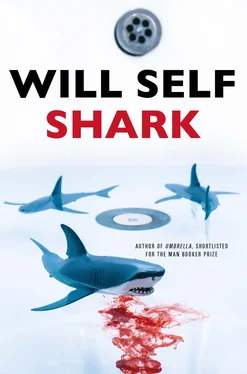Sirbert says . . for putting the leaf in the table when there are only the three of them to dine, so it’s with a chair leg digging into his back that Kins becomes painfully aware of these demotic expressions diluting his father’s normally standard English — a flow that increases as the dumm-dumm-d’dumm-dumm of the barrage gathers in intensity, and the liquid bombshells are poured down Sirbert’s long stiff neck. — When the all-clear sounded two nights ago. .
unless I was so tiddly I imagined it , Sirbert actually said, Go an ’ave a butchers, willyer, Kins. I shan’t bovver to haul meself up ’til Bumbly’s made ’er free ’earts. The very idea that Sirbert might be afraid is preposterous — although why, given his cool assessment of the probabilities, he bothers to fold his long form into this purely symbolic shelter also perplexes his eldest son. Kins has entertained the idea that Sirbert might be doing it in order to comfort Bumbly. Since the incident in the farmyard, with Annette. .
by the light of a haar-vest mooon! . . Kins has tried to factor into his parents’ relations his own mounting passions. It’s difficult, though, because the proposition that Sir Albert should ever have done to Lady De’Ath — whose sobriquet derives as much from her plump dirigible form. .
always bumbling into things . . as it does from her wistfully spirituous absent-mindedness — what Kins wishes fervently to do to Annette is still more preposterous. Although when he considers it — as he does, now, wending through the drab travellers towards his absurdly dressed brother — there’s been an all-round softening in Sirbert’s usually adamant demeanour since his elder son returned. Not that Kins was expecting any browbeating or other unpleasantness, for that. .
isn’t the way between us . It could be Sirbert has intimations of. .
what happened to me — but this Kins doubts. The gulf separating father and son in terms of political philosophy is very wide indeed, but it’s bridged in many places by. .
bridge , which both play to championship standard. It’s also soared over, in perfect arcs, by the golf balls they strike to perfection. On the increasingly rare occasions they play in a four together, their respective partners are the true irritant, for the De’Aths are scratch golfers. — They did, of course, debate the matters of the day, however their positions were by now so well entrenched hostilities were confined to the occasional, largely symbolic salvo of opinion. And when Kins tipped up at the house, explaining such was the general laxness of the establishment he had simply. .
leant my hoe against the barn and, well, sort of wandered off . . Sirbert merely took a short break from mixing his morning messery to recap the principles advanced by Locke in his Second Treatise, before drily observing that — contra Mister Churchill, whose own opinions were invariably partis pris — it seemed to him England’s finest hour was exemplified not by the martial spirit of the general population — surely a given in a fight to the death — but by the wholesale restraint of a government which tolerated the pacifists’ dissent, rather than stringing them up from the nearest lamppost. — As to what Kins intended to do now that he’d abandoned his experiment in Tolstoyan communism, Sirbert was equally dégagé. Kins explained
yet again that his tribunal had placed no restrictions or conditions on him at all — and Sirbert seized on this as an opening, fitting in a potted lecture on the inherent arbitrariness of all arbitration, before pressing into his son’s hand a Gestetnered paper summarising his own application of certain mathematical algorithms to the problems of distributive justice. — They were seated in the drawing room, an elongated space stretching from the bow windows at the front of the house to the glassed-in balcony at the back, and divided by high double doors that are always open. This is the territory Kins’s parents fight over — but it’s a silent battle fought only with things: he’s never heard either of them so much as raise their voice. Bumbly is constantly trying to soften — with vases of flowers, silk cushions and embroidered cloths — the awkward contours of those objects that are deposited on the heavy Edwardian furniture by her husband’s tidal preoccupations. To call Sirbert’s interests anything as joyful as enthusiasms would, Kins felt, be a profound mistake. Looking about him at the sticky coils of capacitors, the transparent teats of valves and a series of heavy zinc-encased batteries — one of which, with utter insensitivity, had been placed on his mother’s spindle-legged escritoire — he was appalled by his father’s relentless single-mindedness. The accumulator man visits the house daily — and Sirbert said: The radio waves resonate in the ears of the just and the unjust. — This wasn’t, Kins knew, intended to be humorous, but was a reference to the hours Sirbert spends, deep into each resonating night, re-jigging his powerful homemade radiogram so he can listen to German, Italian, French and — on those occasions when the sun spots behave — Russian wireless transmissions. It may very well be, Sirbert continued almost coyly, that your brother is being instructed in radio operation now he’s been compelled to join the service. Kins wouldn’t be baited. — Since learning that Michael’s tribunal — acting exactly contrary to his own — had refused any exemption at all, he’d pressed his father for more information, but Sirbert had proved implacable: You say, Peter, your own refusal to serve King and Country is a matter of conscience, and I think we can credit your brother’s conscience with giving him as much trouble as yours does. We must agree that, while Astra inclinant, sed non obligant, in Michael’s case he’s so clearly necessitated in so much of what he does, we should acknowledge his freedom to say what he wants to say to whom he wishes to say it, eh? — Maybe so, Kins thinks, but there’s no harm in asking, and so, staring at the silvery wing that’s sewn to his brother’s pigeon-grey breast, he does so once more: What the bloody hell’ve you got that fancy-dress uniform on for? Then he takes Michael’s hand, shakes it warmly, links it to his own arm, wheels them both round, and off they set at a brisk pace past the
faggot of destinations piled up by the departure board, past the porters
straining at the economical leash . . up from the station’s undersea gloom and towards the bright surface of war-torn London, to where there floats along every gutter a newsstand folded out of Picture Posts and Home Chats, and all the paper-sellers cry out, Ben-nar-ezzz surr-vi-verzzz! — Kins takes in the gas-mask bag hanging from Michael’s shoulder and is on the point of saying something contemptuous, but checks himself: Have you been by the Paragon already? He rattles on: Obviously I didn’t quite make it back last night — those banshees start a’wailin’, old man, and everything goes to pot by way of buses, trains and cabs. I’d’ve strolled back, taken in the show, but everybody gets frightfully officious during a raid — shouting at one and so forth. . Besides, one might easily trip over a hose and biff one’s nose. — The crowds start to press in on them, and before long there’s no further headway to be made towards Parliament Square. Kins says, Apparently there were some incendiaries dropped on the Army & Navy warehouse in Greycoat Place, p’raps Jerry thought it was the actual Army and Navy! He laughs at his own joke, mirth soon dispelled when they’re diverted towards Petty France by. . pettifogging tyrants! — Michael smells the stale beer on his brother’s breath, and suspects he may still be tight — wonders also if the reason Kins keeps such a grip on him is so he can maintain this morale-sapping flow — The ARPs’re nothing but little Hitlers — they’d be perfectly satisfied really if he were the big boss here — under the protection of his brother’s RAF uniform. Certainly they don’t attract any attention, most of those they pass — clerking types, junior civil servants, secretary girls — have weepy exhausted eyes, and their mouths are tightened by the effort required to keep their jaws jutting. Everyone’s too preoccupied to take exception to the sight of two apish pals, arm in arm, out for a stroll. — Ape had been the Lancing boys’ nickname for Kins’s housemaster, a balding man whose tonsure, pot belly and permanently exposed yellow teeth would’ve been an embarrassment of riches for schoolroom satirists, were he not such a kindly fellow. The Ape had been gassed at Ypres — or so the boys whispered among themselves while he whistled gerunds — yet he’d none of the twisted cynicism of other masters who’d served. Happiness, the Ape fluted from his high desk, his gown completely enfolding him, is a by-product of existence in the way that coke is a by-product of coal — you cannot obtain happiness directly, you must mine, sort, ship and finally consume the hard and dirty business of life before you’re granted a little piece of it. — A by-product of the Ape’s wounds was surely his swing-armed and bowlegged gait, his rounded shoulders and the asthmatic sough he made as he sipped the air to see if it was breathable. The De’Ath boys, only a year apart, and pressed into sympathy by their odd and secluded childhood, noticed that they also shared these characteristics with the Ape — although not so well combined with his affability or quiet piety — so they took to calling each other Ape in affectionate remonstrance. — Happiness is a by-product, Ape. — I know, Ape, I know, and the Holy Ghost is a by-product of the Trinity. Beyond this simian similarity there’s hardly any resemblance between the two. Michael cannot fathom from which branch of the family tree his ripe looks have fallen — the flaxen hair, the creamery complexion, the firmly dimpled chin. Bumbly’s people are certainly fair, but, judging by the foxed ovals of their faded studio portraits, these gentle country parsons and dotty spinsters had always been dough-faced and weak-featured, while the current generation — Uncle Martini, the remittance man, Uncle Melville, the DC in Nyasaland — have the distracted appearance of men. .
Читать дальше












